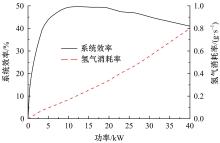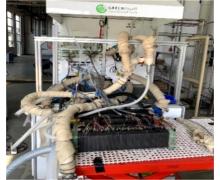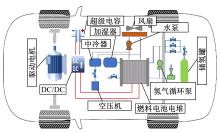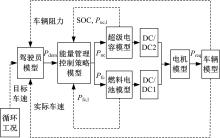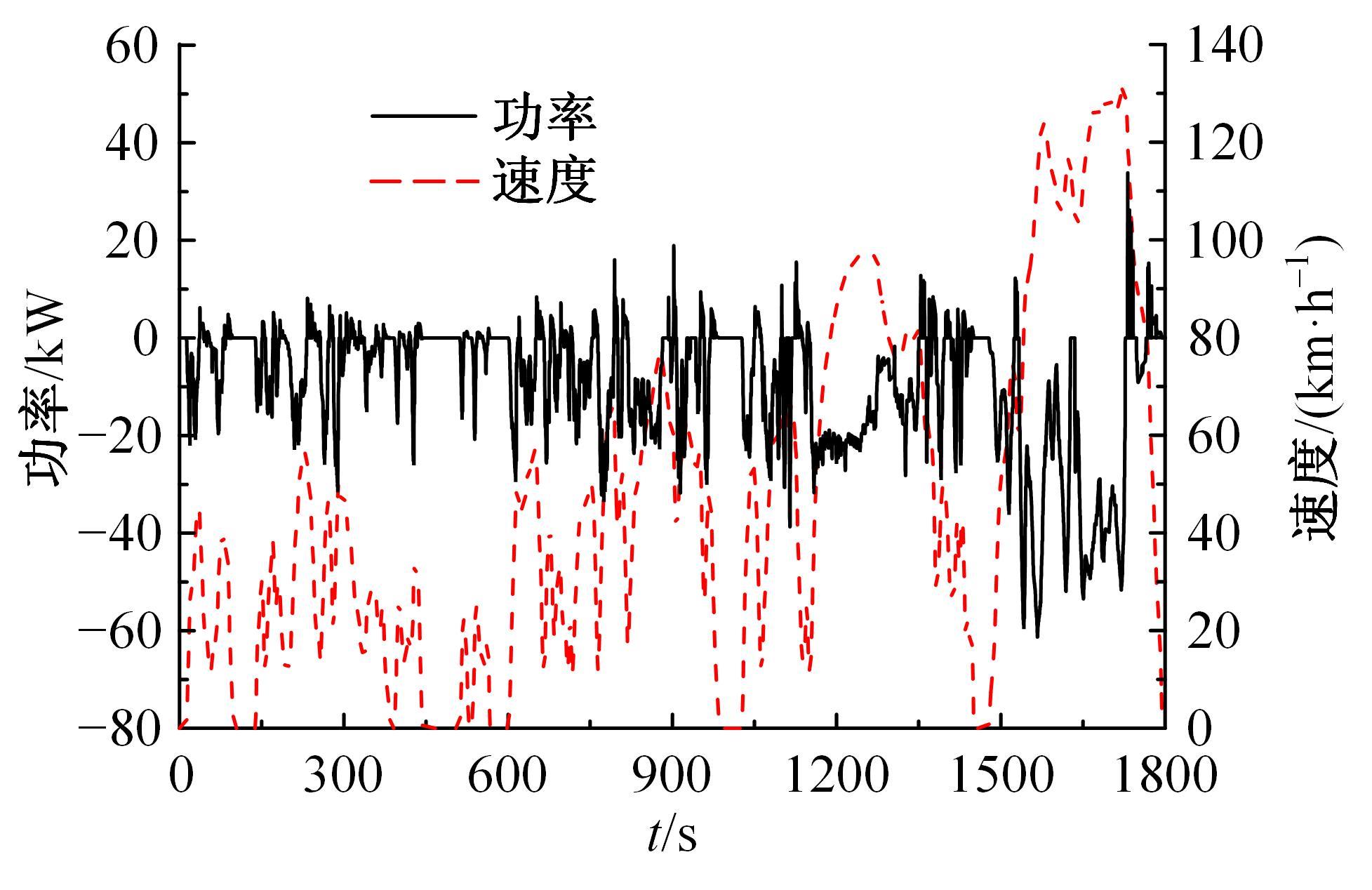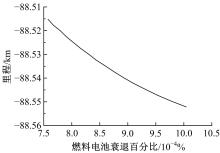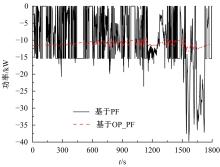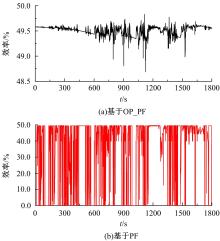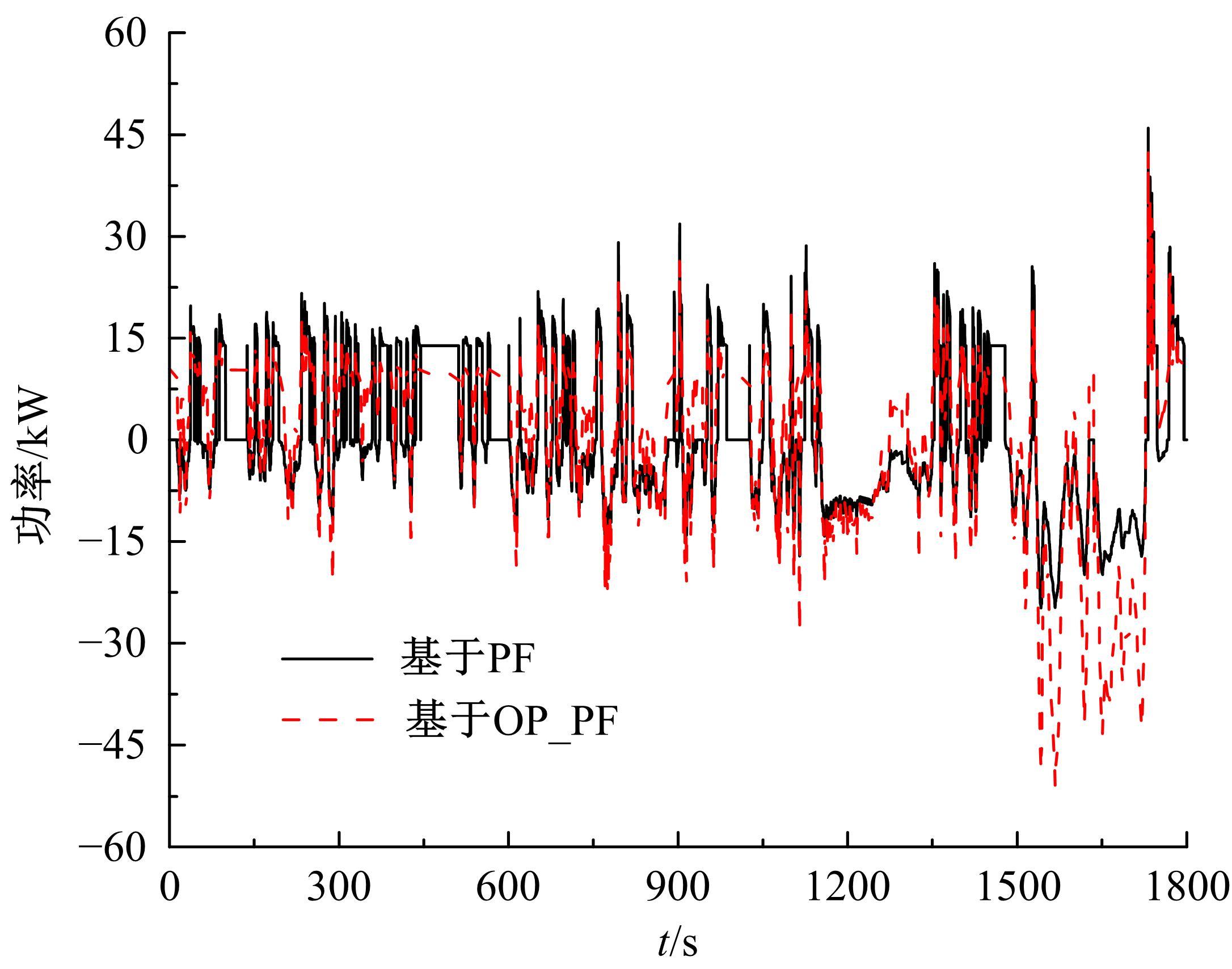吉林大学学报(工学版) ›› 2022, Vol. 52 ›› Issue (9): 2130-2138.doi: 10.13229/j.cnki.jdxbgxb20210773
• • 上一篇
燃料电池电动汽车的能量管理
孙闫1( ),夏长高1(
),夏长高1( ),尹必峰1,韩江义1,高海宇2,刘静1,3
),尹必峰1,韩江义1,高海宇2,刘静1,3
- 1.江苏大学 汽车与交通工程学院,江苏 镇江 212013
2.德燃动力科技有限公司 燃料电池汽车技术研究中心,浙江 嘉兴 314001
3.南京交通职业技术学院 汽车工程学院,南京 211188
Energy management strategy of fuel cell electric vehicles
Yan SUN1( ),Chang-gao XIA1(
),Chang-gao XIA1( ),Bi-feng YIN1,Jiang-yi HAN1,Hai-yu GAO2,Jing LIU1,3
),Bi-feng YIN1,Jiang-yi HAN1,Hai-yu GAO2,Jing LIU1,3
- 1.School of Automotive and Traffic Engineering,Jiangsu University,Zhenjiang 212013,China
2.Fuel Cell Vehicle Technology Research Center,D. R. Power Technology Co. ,Ltd. ,Jiaxing 314001,China
3.School of Automotive Engineering,Nanjing Vocational Institute of Transport Technology,Nanjing 211188,China
摘要:
为了研究一类以超级电容和燃料电池作为能量来源的电动汽车能量管理的问题,首先建立了燃料电池和超级电容模型,其中,包括燃料电池性能衰退模型;其次,提出了一种改进的功率跟随能量管理控制策略,通过对二次型效用函数进行偏微分并结合Karush-Kuhn-Tucker(KKT)条件将需求功率分解为燃料电池和超级电容各自的目标功率;最后,采用多目标人工蜂群算法和Pareto解集迭代求解算法内部的最佳平衡系数,同时提升了整车经济性及燃料电池的耐久性。仿真结果表明:与传统功率跟随策略相比,本文改进功率跟随策略可以降低2%的等效氢气消耗,并降低92.66%的燃料电池性能衰退,车辆只需要消耗1.2 kg氢气即可行驶88.52 km。
中图分类号:
- U469.72
| 1 | 张炎治,冯颖,张磊.中国碳排放增长的多层递进动因-基于SDA和SPD的实证研究[J]. 资源科学, 2021, 43(6): 1153-1165. |
| Zhang Yan-zhi, Feng Ying, Zhang Lei. Analysis on the progressive motivation of carbon emissions growth in China using structural decomposition analysis and structural path decomposition methods[J]. Resources Science, 2021, 43(6): 1153-1165. | |
| 2 | Zhou Meng-ge, Hu Ting-ting. Analysis of carbon emission status under the carbon neutral target in China for earth's atmospheric balance[J]. IOP Conference Series: Earth and Environmental Science, 2021, 804(4): No.042082. |
| 3 | Kang Jia-ning, Wei Yi-ming, Liu Lan-cui, et al. Observing technology reserves of carbon capture and storage via patent data: paving the way for carbon neutral[J]. Technological Forecasting & Social Change, 2021, 171(6): No.120933. |
| 4 | 王哲,谢怡,臧鹏飞,等. 基于极小值原理的燃料电池客车能量管理策略[J]. 吉林大学学报: 工学版, 2020, 50(1): 36-43. |
| Wang Zhe, Xie Yi, Zang Peng-fei, et al. Energy management strategy for fuel cell buses based on the principle of minimum value[J]. Journal of Jilin University (Engineering and Technology Edition), 2020, 50(1): 36-43. | |
| 5 | 骆永伟,朱亮,王向飞,等. 电解水制氢催化剂的研究与发展[J]. 金属功能材料, 2021, 28(3): 58-66. |
| Luo Yong-wei, Zhu Liang, Wang Xiang-fei, et al. Research and development of electrolytic water hydrogen production catalyst[J]. Metallic Functional Materials, 2021, 28(3): 58-66. | |
| 6 | 马梓璇,张昱曈,颜胜,等. 一种基于太阳能的氢燃料电池汽车自产氢供应系统[J]. 应用能源技术, 2021, 37(6): 47-49. |
| Ma Zi-xuan, Zhang Yu-tong, Yan Sheng, et al. A self-produced hydrogen supply system for hydrogen fuel cell vehicles based on solar energy[J]. Applied Energy Technology, 2021, 37(6): 47-49. | |
| 7 | 白玫. “十四五”时期新能源汽车产业竞争力提升的方向与路径[J]. 价格理论与实践, 2021, 40(2): 18-24. |
| Bai Mei. The direction and path of improving the competitiveness of energy automobiles industry during the "14th Five Year Plan" period[J]. Price: Theory & Practice, 2021, 40(2): 18-24. | |
| 8 | 金希计. 新能源汽车的技术原理和优缺点探究[J]. 时代汽车, 2020, 16(15): 80-81. |
| Jin Xi-ji. Research on the technical principles, advantages and disadvantages of new energy vehicle[J]. Auto Time, 2020, 16(15): 80-81. | |
| 9 | Kim Y B, Kim E J, Yoon J, et al. Design and performance evaluation of integral-type hot BoP for recovering high-temperature exhaust gas in 2 kW class SOFC[J]. Applied Chemistry for Engineering, 2019, 30(1): 62-67. |
| 10 | 皇甫宜耿,任子俊,张羽翔,等. 质子交换膜燃料电池动态特性建模及仿真[J]. 电力电子技术, 2020, 54(12): 44-46. |
| Huangfu Yi-geng, Ren Zi-jun, Zhang Yu-xiang, et al. Dynamic characteristics molding and simulation of proton exchange membrane fuel cell[J]. Power Electronics, 2020, 54(12): 44-46. | |
| 11 | 刘楠,李明高,郭爱,等. 基于价值损耗的燃料电池混合动力能量管理策略评价[J]. 太阳能学报, 2021, 42(2): 281-288. |
| Liu Nan, Li Ming-gao, Guo Ai, et al. Evaluation of energy management strategy based on value loss of fuel cell hybrid system[J]. Acta Energiae Solaris Sinica, 2021, 42(2): 281-288. | |
| 12 | Ma S, Lin M, Lin T E, et al. Fuel cell-battery hybrid systems for mobility and off-grid applications: a review[J]. Renewable and Sustainable Energy Reviews, 2021, 135: No. 110119. |
| 13 | Yuan J N, Yang L, Chen Q. Intelligent energy management strategy based on hierarchical approximate global optimization for plug-in fuel cell hybrid electric vehicles[J]. International Journal of Hydrogen Energy, 2018, 43(16): 8063-8078. |
| 14 | Soumeur M A, Gasbaoui B, Abdelkhalek O, et al. Comparative study of energy management strategies for hybrid proton exchange membrane fuel cell four wheel drive electric vehicle[J]. Journal of Power Sources, 2020, 462: No. 228167. |
| 15 | 王骞,李顶根,苗华春. 基于模糊逻辑控制的燃料电池汽车能量管理控制策略研究[J]. 汽车工程, 2019, 41(12): 1347-1355. |
| Wang Qian, Li Ding-gen, Miao Hua-chun. Research on energy management strategy of fuel cell vehicle based on fuzzy logic control[J]. Automotive Engineering, 2019, 41(12): 1347-1355. | |
| 16 | Geng C, Jin X F, Zhang X. Simulation research on a novel control strategy for fuel cell extended-range vehicles[J]. International Journal of Hydrogen Energy, 2019, 44(1): 408-420. |
| 17 | Zhou Y, Ravey A, Péra M C. Multi-objective energy management for fuel cell electric vehicles using online-learning enhanced Markov speed predictor[J]. Energy Conversion and Management, 2020, 213: No. 112821. |
| 18 | Wu J L, Zhang N, Tan D K, et al. A robust online energy management strategy for fuel cell/battery hybrid electric vehicles[J]. International Journal of Hydrogen Energy, 2020, 45(27): 14093-14107. |
| 19 | 刘琦,詹跃东,李瑞棋. 燃料电池汽车能量管理策略多目标优化研究[J]. 电子测量技术, 2020, 43(20): 31-36. |
| Liu Qi, Zhan Yue-dong, Li Rui-qi. Research on a multi-objective optimization energy management strategy for fuel cell electric vehicles[J]. Electronic Measurement Technology, 2020, 43(20): 31-36. | |
| 20 | Chen H, Chen J, Lu H X, et al. A modified MPC-based optimal strategy of power management for fuel cell hybrid vehicles[J]. IEEE/ASME Transactions on Mechatronics, 2020, 25(4): 2009-2018. |
| 21 | Muñoz P M, Correa G, Gaudiano M E, et al. Energy management control design for fuel cell hybrid electric vehicles using neural networks[J]. International Journal of Hydrogen Energy, 2017, 42(48): 28932-28944. |
| 22 | İnci M, Büyük M, Demir M H, et al. A review and research on fuel cell electric vehicles: Topologies, power electronic converters, energy management methods, technical challenges, marketing and future aspects[J]. Renewable and Sustainable Energy Reviews, 2021, 137: No.110648. |
| 23 | Pei P C, Chang Q F, Tang T. A quick evaluating method for automotive fuel cell lifetime[J]. International Journal of Hydrogen Energy, 2008, 33(14): 3829-3836. |
| 24 | Song K, Chen H, Wen P M, et al. A comprehensive evaluation framework to evaluate energy management strategies of fuel cell electric vehicles[J]. Electrochimica Acta, 2018, 292: 960-973. |
| 25 | Chen G H, Niu W, Gu W, et al. Game-based energy management method for hybrid RTG cranes[J]. Energies, 2019, 12(18): No.3589. |
| [1] | 刘继宗,吴小平,孔维华. 基于鱼群优化算法的有轨电车用燃料电池混合动力系统参数配置[J]. 吉林大学学报(工学版), 2022, 52(9): 2004-2013. |
| [2] | 隗海林,王泽钊,张家祯,刘洋. 基于Avl-Cruise的燃料电池汽车传动比及能量管理策略[J]. 吉林大学学报(工学版), 2022, 52(9): 2119-2129. |
| [3] | 张冲,胡云峰,宫洵,孙耀. 燃料电池阴极流量无模型自适应滑模控制器设计[J]. 吉林大学学报(工学版), 2022, 52(9): 2085-2095. |
| [4] | 都京,赵洪辉,王宇鹏,丁天威,魏凯,王恺,韩令海. 基于AMESim模型的燃料电池发动机排氢策略优化及整车搭载验证[J]. 吉林大学学报(工学版), 2022, 52(9): 2069-2076. |
| [5] | 胡云峰,于彤,杨惠策,孙耀. 低温环境下燃料电池启动优化控制方法[J]. 吉林大学学报(工学版), 2022, 52(9): 2034-2043. |
| [6] | 杨子荣,李岩,冀雪峰,刘芳,郝冬. 质子交换膜燃料电池运行工况参数敏感性分析[J]. 吉林大学学报(工学版), 2022, 52(9): 1971-1981. |
| [7] | 张佩,王志伟,杜常清,颜伏伍,卢炽华. 车用质子交换膜燃料电池空气系统过氧比控制方法[J]. 吉林大学学报(工学版), 2022, 52(9): 1996-2003. |
| [8] | 刘镇宁,江柯,赵韬韬,樊文选,卢国龙. 大功率质子交换膜燃料电池测试系统的开发及试验[J]. 吉林大学学报(工学版), 2022, 52(9): 2025-2033. |
| [9] | 陈凤祥,张俊宇,裴冯来,侯明涛,李其朋,李培庆,王洋洋,张卫东. 质子交换膜燃料电池氢气供应系统的建模及匹配设计[J]. 吉林大学学报(工学版), 2022, 52(9): 1982-1995. |
| [10] | 张恒,詹志刚,陈奔,隋邦杰,潘牧. 气体扩散层各向异性传输特性的孔尺度模拟[J]. 吉林大学学报(工学版), 2022, 52(9): 2055-2062. |
| [11] | 裴尧旺,陈凤祥,胡哲,翟双,裴冯来,张卫东,焦杰然. 基于自适应LQR控制的质子交换膜燃料电池热管理系统温度控制[J]. 吉林大学学报(工学版), 2022, 52(9): 2014-2024. |
| [12] | 池训逞,侯中军,魏伟,夏增刚,庄琳琳,郭荣. 基于模型的质子交换膜燃料电池系统阳极气体浓度估计技术综述[J]. 吉林大学学报(工学版), 2022, 52(9): 1957-1970. |
| [13] | 武小花,余忠伟,朱张玲,高新梅. 燃料电池公交车模糊能量管理策略[J]. 吉林大学学报(工学版), 2022, 52(9): 2077-2084. |
| [14] | 陈凤祥,伍琪,李元松,莫天德,李煜,黄李平,苏建红,张卫东. 2.5吨燃料电池混合动力叉车匹配、仿真及优化[J]. 吉林大学学报(工学版), 2022, 52(9): 2044-2054. |
| [15] | 刘汉武,雷雨龙,阴晓峰,付尧,李兴忠. 增程式电动汽车增程器多点控制策略优化[J]. 吉林大学学报(工学版), 2022, 52(8): 1741-1750. |
|
||
